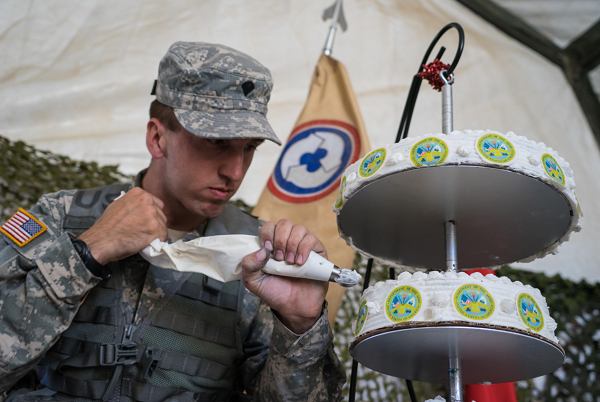Working as the Army Culinary Specialist (MOS 92G) allows you to show your skills in the kitchen.
These specialists are responsible for preparing and cooking food in the field or garrison.
If you love cooking and making others happy through food, this MOS is perfect for you.
Continue reading for information on requirements, job duties, pay, and more.
Requirements and Educations
To enter into MOS 92G, individuals will need to take the ASVAB test and score at least 85 on the Operators and Food (OF) section.
Individuals must have a high school diploma or GED to enter and pass all physical/medical evaluations.
To train as a Culinary Specialist, recruits will first attend Basic Combat Training for 10 weeks.
Advanced Individual Training (AIT) for this MOS will be nine weeks at the Joint Culinary Center of Excellence at Gregg-Adams, VA.
Advanced training will consist of classroom and fieldwork, including practice in preparing food.
It is helpful if recruits have an interest in cooking, home economics, and health.
Mathematics, accounting, and chemistry interest are also helpful in this MOS.
Related Article – Marines Food Service Specialist (MOS 3381): Career Details
What Does a Culinary Specialist Do?
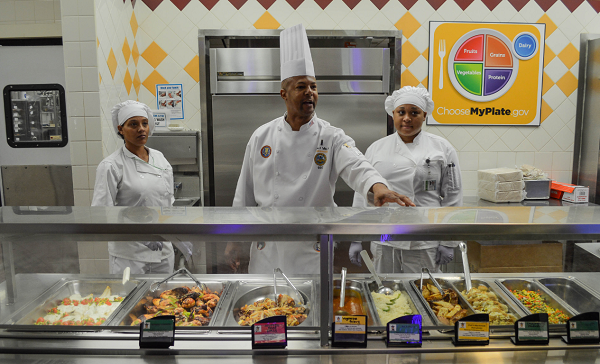
Army Culinary Specialists are the ones who provide Army soldiers with breakfast, lunch, dinner, and sometimes midnight meals.
They complete all functions of the kitchen, from ordering and storage to food preparation and service.
The Specialist completes dining facility administration for smooth service and delivery.
Ordering and Storage
Army Culinary Specialists will keep kitchen inventories to ensure product levels are efficient for cooking.
Specialists use inventory lists and menu planning to order products.
When products arrive, they will store them in storage areas based on food safety regulations.
They ensure products are being rotated and do not expire.
Per food safety guidelines, both food and chemicals must be stored in certain locations and in a certain order (top to bottom), and the specialist must know these guidelines and ensure they are met at all times.
Related Article – Marine Water Dog (MOS 1171): Career Details
Food Preparation
Specialists complete food preparation duties.
Food preparation may include cutting up or dicing vegetables and meat for meals.
It may also include preparing bases for soups and sauces.
Part of food preparation is meal planning.
Specialists try to ensure they provide meals that provide sustaining energy for soldiers.
They must be knowledgeable about nutrition.
Specialists work on creating recipes and menus.
They document the steps to create the product and keep the recipe steps for reference to ensure consistency.
Part of this function is knowing allergens for certain soldiers and avoiding food cross-contamination.
Meal planning assists with inventory control and allows for sufficient food prep.
Related Article – Army MOS List: A List Of All 159 Army Jobs
Equipment and Set Up
There are many different kitchen tools that specialists use.
They must be able to use them safely and quickly to avoid injury and wasting product.
Specialists may be responsible for setting up proper operating procedures on kitchen equipment and training others on their use.
In addition to setting up proper operating procedures, they will perform any regular maintenance on equipment.
They will use sharpening equipment to keep knives sharp and use a scale to weigh a variety of foods.
The specialists set up the serving lines for each meal.
Setting up serving lines includes taking time for proper presentation and displaying menu cards with food information.
Part of this position is also cleaning up dishes, equipment, dining facilities, or work areas used.
Cooking for soldiers does not just happen in a fixed location.
Specialists also prepare meals in the field as well.
They will use the Army Field Feeding System and Mobile Kitchen Trailer.
This unit fits on a trailer and is set up and expanded into a full mobile kitchen for food preparation and cooking.
Related Article – Army Reserves Vs. National Guard
Cooking
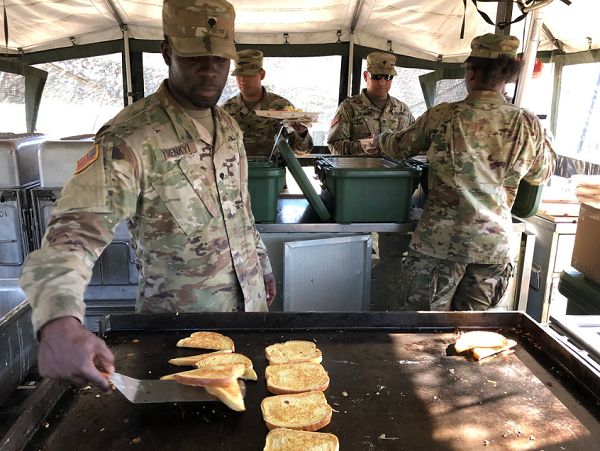
Specialists cook meals for soldiers in large quantities.
Meals can be prepared for a few dozen to a few hundred.
The meals they serve are in mess halls, Dining Facilities Administration Centers (DFACs), or field areas.
They prepare breakfast, lunch, and dinner in addition to desserts and appetizer foods, such as salads.
The Specialist uses different techniques to cook meals including dicing, slicing, sauteing, frying, broiling, baking, roasting, and more.
Specialists try to cook meals that will sustain, taste good, and look appetizing.
Preparing a good meal for soldiers can have an effect on morale and help lift their spirits.
Time management and understanding how to complete conversions are important tasks when cooking food.
Food must be cooked to temperature and to meet food safety guidelines.
Related Article: 20 Reasons to Join the Military (and 7 reasons not to)
Culinary Competitions
One thing that specialists look forward to is culinary competitions.
These competitions are a chance for specialists to show their skills and to keep their skills sharp.
It is a creative outlet for specialists.
They complete ice sculptures, cake designs, and chocolate molding.
Culinary competitions also include cooking varieties of meals for judgment.
Competitions are competed against other branches of service, all around the world.
Certifications
Working in this MOS provides opportunities for soldiers to prove their skills and receive culinary certifications.
These certifications are through the American Culinary Federation, National Environmental Health Association (NEHA), National Registry of Food Safety Professionals (NRFSP), and others.
They are recognized as an accomplishment in both the Army and civilian sectors.
The Army video below provides more information on job duties and training.
Related Article: 20 Best Jobs For Veterans
What Does an Army Culinary Specialist Get Paid?
Army Culinary Specialists will be paid based on rank and time of service.
Those who enter into this MOS with no prior military experience or college education can expect to make between $1,700 to $1,900 a month.
As rank increases, so will the pay.
In addition to base pay, there are opportunities for bonuses and special pay.
Bonuses can occur in certain recruiting scenarios or other situations based on Army needs.
Special pay opportunities happen during situations such as deployment or hazard pay.
The table below provides an outlook on Army pay based on rank.
| Pay Grade | Less than 2 Years | Over 2 Years | Over 3 Years | Over 4 Years | Over 6 Years |
|---|---|---|---|---|---|
| E-1 | $1,917.60 | $1,917.60 | $1,917.60 | $1,917.60 | $1,917.60 |
| E-2 | $2,149.20 | $2,149.20 | $2,149.20 | $2,149.20 | $2,149.20 |
| E-3 | $2,259.90 | $2,402.10 | $2,547.60 | $2,547.60 | $2,547.60 |
| E-4 | $2,503.50 | $2,631.60 | $2,774.10 | $2,914.80 | $3,039.30 |
| E-5 | $2,730.30 | $2,914.20 | $3,055.20 | $3,199.20 | $3,423.90 |
| E-6 | $2,980.50 | $3,279.90 | $3,424.80 | $3,356.50 | $3,711.90 |
| E-7 | $3,445.80 | $3,760.80 | $3,905.10 | $4,095.30 | $4,244.70 |
Benefits
The base income above might seem low when you first look at it.
The Army provides its soldiers with many benefits that add to the base income.
One of the biggest benefits is being provided with housing.
Housing is provided on base and includes utility and maintenance costs.
An allowance is also available for those who are authorized to live off the base.
Another benefit is receiving free or low-cost (depending on your family situation) health insurance and dental.
You receive services at military medical facilities for free and are provided with low deductibles for out-of-network expenses.
Other benefits include:
- Retirement
- Low-cost life insurance
- Education tuition assistance
- Vacation
- Sick pay
Related Article – Navy Culinary Specialist (CS): Career Details
Job Reviews
Soldiers who have previously worked as Culinary Specialists express that the best part of their job is seeing a soldier who is hungry, cold, wet, and tired, be able to enjoy a hot meal.
They enjoy cooking for people and take advantage of learning new skills.
The hours in this position may vary depending on which shift you work and are noted as sometimes being long.
Reviews discuss the team environment that is required to be successful.
Positive aspects include enjoying food service, great benefits, and learning skills that can be used in future employment.
Some negative reviews discuss short breaks, time away from family, and potentially being called in to prepare late-night meals.
The review below provides more information on a typical day and the pros/cons of the position.
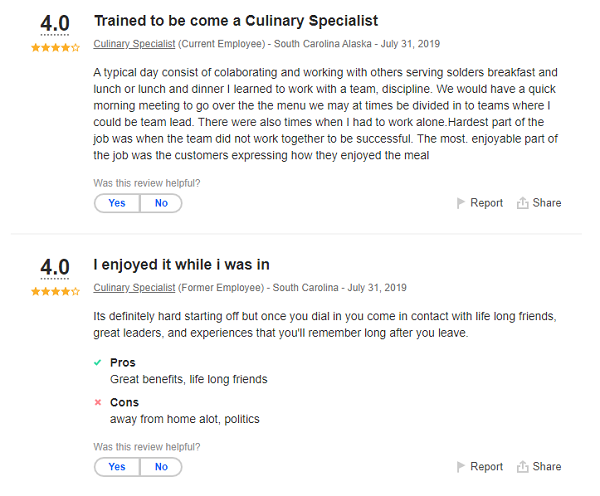
The video below discusses the position from a 92G.
Civilian Career Opportunities
Working as an Army Culinary Specialist provides skills in food preparation, cooking, and baking.
Experience preparing meals for a large number of people can relate to working in cafeterias, hotels, hospitals, schools, or nursing facilities.
Specialists are not just limited to working in areas that serve meals in large quantities; they can find work in restaurants, cafes, or other dining facilities that serve single meals.
Certifications earned in this position can help Specialists receive higher paying civilian cook or chef positions.
The skills in this MOS also relate to working for businesses that sell food service products to restaurants and as culinary teachers.
For those who join the PaYS program during recruiting, a job interview with a military-friendly restaurant of your choice is guaranteed after completing service.
Summary
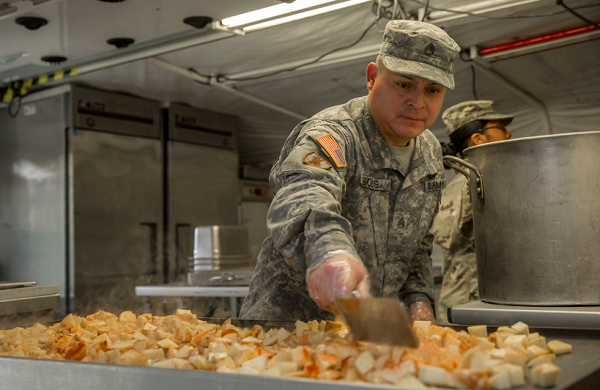
Army Culinary Specialists (MOS 92G) are the masters in the kitchen.
They complete tasks related to food preparation, storage, cooking, baking, and ordering.
Not only do they cook for soldiers in garrison, but they also provide double duty in the field as a soldier and cook.
Entering into this MOS will require a score of at least 85 on the Operators and Food portion of the ASVAB test as well as general entry requirements.
Training consists of basic training and AIT to develop culinary skills.
Previous Culinary Specialists enjoyed the position and being able to provide satisfying meals to soldiers.
Working in this MOS can lead to civilian jobs in culinary facilities around the world.
Related Article – Military Terms/Slang
References
- Ikon Pass Military Discount: Learn How To Save Big - January 31, 2025
- RTIC Military Discount: Find Out How To Save Big on Gear - January 30, 2025
- Traeger Military Discount: Learn How To Save Big on Smokers - January 28, 2025

